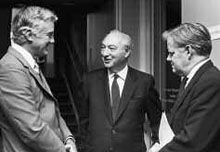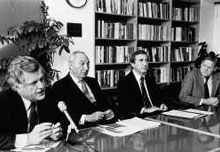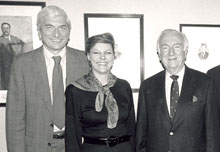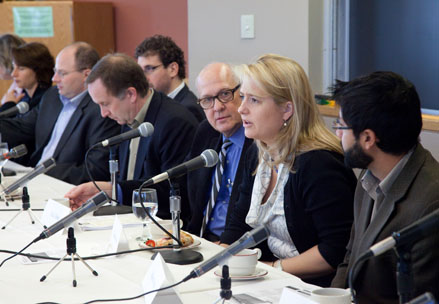The Beginning
The Shorenstein Center was founded in 1986, but its roots can be traced back to the early days of the John F. Kennedy School of Government. The Kennedy School has been singular in declaring its mission to be teaching and research plus engagement with the real world, something that sets it apart. Early on, leaders at the School recognized that engagement with the press should be part of the School’s focus.

Initially, that role was taken by the Institute of Politics, founded in 1966 with a mandate to inspire young people to careers in public service. Jonathan Moore was a member of the first group of IOP fellows and was chosen to be the institute’s director in 1974. Under Moore the IOP broadened its engagement with the press, conducting research, sponsoring conferences and inviting journalists to Harvard as fellows.
But Moore and others recognized that the topic was too important to be adequately addressed as a subsidiary part of the institute, and in 1980 he drafted a proposal for a Harvard center on the press, politics and public policy. Graham Allison, Dean of the Kennedy School, and Derek Bok, the President of Harvard, embraced the concept with great enthusiasm.
A planning committee was established for the proposed center that included Samuel H. Beer, Hale Champion, Marty Linsky, Jonathan Moore, Richard E. Neustadt, Anthony G. Oettinger, David Riesman, Robin Schmidt and James C. Thomson Jr. An advisory committee was also formed, with members David Broder, Otis Chandler, Hedley W. Donovan, Katharine Graham, Stephen Hess, James Hoge, J. Anthony Lukas, Robert J. Manning, Alan L. Otten, Dan Rather, Jack Rosenthal, Frank Stanton and William O. Taylor.
Harvard University created a new endowment fund titled “Media, Politics and Public Policy Center” with a $50,000 transfer from the Institute of Politics. Other early donors included the Boston Globe Foundation, Cox Enterprises, Jane Bancroft Cook, the Jessie B. Cox Charitable Trust, Gardner Cowles, Walter Cronkite, Field Enterprises, General Electric Foundation and the Philip L. Graham Fund.
The IOP continued to host events and conduct research on the press and politics, and led the continued fundraising for the new center. These efforts resulted in $5 million in endowment funds for professorships, programs and fellowships.
On March 10, 1985, Joan Shorenstein Barone died of cancer at the age of 38. At the time of her death, she was a producer of The CBS Evening News with Dan Rather. Joan had been inspired to go into political journalism by Washington Post reporter David Broder, who was an IOP Fellow in 1969 when Joan was a graduate student at Harvard. After Joan’s death, her parents, Walter H. and Phyllis J. Shorenstein, sought to establish a memorial for their daughter. In conversations with Senator Edward M. Kennedy, Graham Allison, Derek Bok and Jonathan Moore, the Shorenstein family was persuaded that a Harvard research center dedicated to the study of press and politics would be an excellent tribute to Joan.
The Announcement

On December 10, 1985, Harvard University announced an endowment gift of $5 million from Walter and Phyllis Shorenstein for a new center to be named the Joan Shorenstein Barone Center on the Press, Politics and Public Policy. In subsequent years, Mr. Shorenstein contributed an additional $10 million to the endowment as well as numerous other gifts in support of the Washington office and Center programs. The name was changed to the Joan Shorenstein Center on the Press, Politics and Public Policy in 1995, and in 2013, the name was changed to the Shorenstein Center on Media, Politics and Public Policy.
On September 27, 1986, the Shorenstein Center officially opened for business. Benjamin C. Bradlee delivered an address on national security and the press, and remarks were made by Senator Edward M. Kennedy, David Broder, Derek Bok, Walter H. Shorenstein and Jonathan Moore. The Shorenstein Center became the first named research center at the Harvard Kennedy School.
Building the Center
The distinguished political scientist Nelson W. Polsby was appointed Visiting Professor in the Frank Stanton Chair of the First Amendment and arrived in the fall of 1986. He also served as acting director of the Shorenstein Center. Polsby recruited the first fellows for the Center and hired a staff. The Center became home to graduate students from Harvard’s government department and the Kennedy School and hosted brown-bag lunches and faculty seminars.
Guest speakers during the first year included Howell Raines, Leonard Downie, Geoffrey Smith, Tom Patterson, Alan Ehrenhalt, Dan Hallin, W. Russell Neuman, Stephen Hess and others. Polsby and Kennedy School professor Gary Orren co-taught a seminar on the press and politics and co-edited Media and Momentum: The New Hampshire Primary and Nomination Politics. The Center co-sponsored a conference on “Voting, Public Opinion and the 1988 Elections” with the National Election Studies.

On June 1, 1987, veteran journalist Marvin Kalb became director of the Shorenstein Center and Edward R. Murrow Professor of Press and Public Policy. The Murrow Chair was later endowed through generous gifts from G. Barry Bingham Jr., Mary Bingham, and many other individuals, corporations and foundations.
One of Kalb’s first moves as director was to propose a series of television interviews with all of the presidential candidates. In the fall of 1987, the 12-part series “Candidates ’88” aired on PBS. It featured Kalb’s interviews with Republican and Democratic presidential candidates, broadcast live from the Forum at the Kennedy School. A book about the series was published, featuring essays on all the candidates by Shorenstein Fellow Hendrik Hertzberg.
Growth 1989 – 2015

In 1989 the Theodore H. White Lecture on Press and Politics was inaugurated with a panel discussion in the Forum featuring R. W. Apple Jr., Benjamin C. Bradlee and John King Fairbank. Blair Clark, a Shorenstein Center advisory board member and former vice-president of CBS News, worked closely with Marvin Kalb to raise the funds from more than one hundred friends and admirers of the reporter. Honored the next year was legendary broadcast journalist Walter Cronkite. Since its establishment, the Theodore H. White Lecture has become one of the hallmarks of the Shorenstein Center.
The Shorenstein Center’s first Visiting Lombard Professor was Tim Cook. A Williams College professor of political science, Cook taught a course on the press and government in the spring of 1990. The Laurence M. Lombard Professorship was established by the family and friends of Mr. Lombard, a director of Dow Jones & Company for 28 years.
Frederick Schauer served as Frank Stanton Professor of the First Amendment from 1990–2008. The chair was funded in the early 1980s by gifts from dozens of media organizations and individuals in honor of Dr. Frank Stanton, president emeritus of CBS.
The chance meeting of a Harvard professor and a Philadelphia lawyer on a beach in Florida led to the establishment of one of journalism’s preeminent prizes, which is awarded by the Shorenstein Center. The professor, Gary Orren, and the lawyer, Robert Greenfield, soon joined with Marvin Kalb to create the Goldsmith Awards Program. The concept began with a desire to encourage strong investigative reporting and grew to include book prizes, fellowships and an annual career award. The Goldsmith Prize for Investigative Reporting, first awarded in 1993, has become one of the most prestigious awards in journalism.
The first occupant of the Bradlee Chair in Government and the Press is Thomas E. Patterson, who arrived at Harvard from Syracuse University in 1996. Benjamin C. Bradlee, former executive editor of the Washington Post, donated funds for the chair in the early 1980s.
Marvin Kalb directed the Center from 1987 until 1999. He formalized the Fellowship Program and expanded the research output of the Center through foundation-funded projects on presidential press conferences, the Pentagon Papers, press coverage of the Soviet Union, race, presidential election campaigns, the Los Angeles riots, China, financial institutions and more. He developed the introductory course on press, politics and public policy, expanded the Kennedy School’s curriculum, and led a program on media and American democracy for high school teachers. With co-editor Pippa Norris, Kalb launched the Harvard International Journal of Press/Politics [now The International Journal of Press/Politics, Sage Publications].

The Pulitzer Prize–winning journalist Alex S. Jones served as director of the Shorenstein Center from July 2000 until July 2015. Jones enhanced the Fellowship Program, raised the profile of the Goldsmith Awards, launched new initiatives to increase student engagement, and broadened the advisory board. He strengthened the financial underpinnings of the Center, with the strong support of the Shorenstein family. Jones convened conferences on new issues such as WikiLeaks, blogging and journalism and the reporting of science.
The Center became one of 12 institutions selected to participate in the Carnegie-Knight Initiative on the Future of Journalism Education. As part of the Initiative, the Center created and operates Journalist’s Resource, a website devoted to knowledge-based reporting.
The Center established the Lynette Lithgow Summer Internship Award, research assistant positions and full-tuition scholarships. The David Nyhan Prize for Political Journalism was endowed in 2005 and is awarded in conjunction with the annual Theodore H. White Lecture. The annual Richard S. Salant Lecture on Freedom of the Press was endowed in 2007, and the A.M. Rosenthal Writer-in-Residence program was established in 2010.
In December 2013, the Kennedy School announced an ambitious new fellowship in honor of Walter Shorenstein and a name change for the Center. A gift of $5 million from Doug and Lydia Shorenstein to Harvard University is used to fund the Walter Shorenstein Media and Democracy Fellowship. The fellowship brings high-profile figures in the areas of media, politics and policy to the Kennedy School to engage with students, faculty, scholars and the public on important issues of the moment. The Center’s name became the Shorenstein Center on Media, Politics and Public Policy, in order to recognize the generosity and commitment of the Shorensteins to the Center whose name will now honor the entire family. The new name also more accurately reflects the Center’s broad focus on media in all its forms. The Walter Shorenstein Fellowship pays special tribute to the Center’s original benefactor and the original Shorenstein Fellowships are now titled the Joan Shorenstein Fellowships.
On July 1, 2016, Nicco Mele became the director of the Shorenstein Center. He previously served as the Wallis Annenberg Chair in Journalism at the University of Southern California and was former senior vice president and deputy publisher of the Los Angeles Times. Under Mele’s leadership the Center expanded its research scope to focus on four key areas at the intersection of media, politics and public policy which have an impact on democracy.
Thanks to former Shorenstein Center Executive Director Nancy Palmer for this narrative of the Center’s history.
Today
Nancy Gibbs became Director of the Shorenstein Center in April of 2019. Gibbs is the former Editor in Chief of TIME and former editorial director of the TIME Inc. News Group. She joined TIME in 1985 and worked as a writer and editor before taking on senior management roles. Gibbs was named TIME’s 17th managing editor in 2013 and was the first woman to hold the position. She is one of the most published writers in the magazine’s history, having covered four presidential campaigns and written more cover stories than any other writer. Gibbs won the National Magazine Award for her cover story in Time’s black-bordered September 11, 2001, special issue. She is the co-author, along with Michael Duffy, of two best-selling presidential histories: The President’s Club: Inside the World’s Most Exclusive Fraternity (2012) and The Preacher and the Presidents: Billy Graham in the White House (2007).
Gibbs has emphasized the focus of the Center’s work on the currently evolving and troubled information ecosystem, and its impact on democracy. Through this lens, the Center’s focus is on studying how information is created, distributed, and understood, and the ways that problems in this flow of information lead to issues in societies.
Read More
Dive deeper into short biographies of the Center’s influential namesake and founders: Joan Shorenstein, Walter Shorenstein, and Doug Shorenstein.

